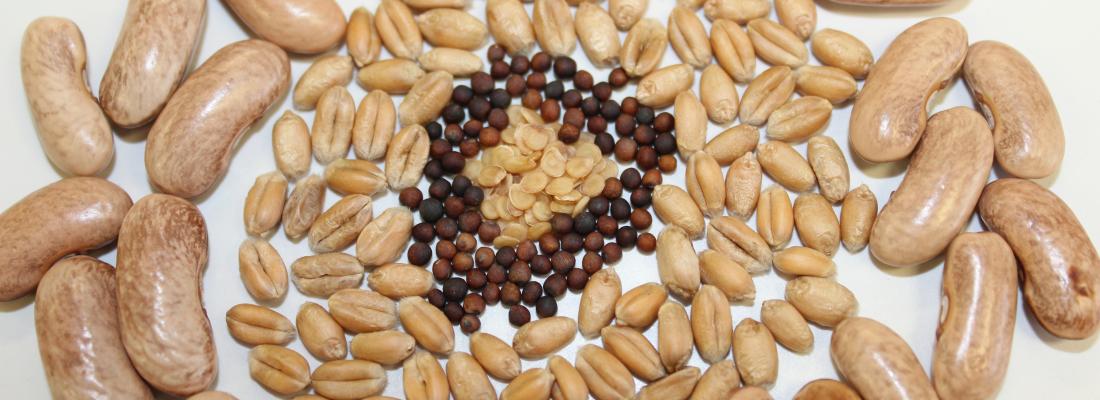France
March 21, 2022
INRAE researchers from the Research Institute of Horticulture and Seeds have conducted a meta-analysis of 63 international studies on seed microbiota. The results of this study, published in New Phytologist, indicate the systematic presence of the same bacteria and fungi in the 50 plant species studied.
 © Myriam Risserand
© Myriam Risserand
The seed microbiota, a world waiting to be explored
Seeds are essential for food production and the maintenance of plant biodiversity. However, the seed microbiota remains understudied compared to other plant compartments, such as roots or leaves. Yet, this seed microbiota constitutes a primary inoculum for plants that could play a major role in plant health and productivity.
In this context, INRAE researchers from the Research Institute of Horticulture and Seeds (IRHS) have conducted a first worldwide meta-analysis of 63 studies characterising the microbiota of seeds covering 50 plant species. This research work, published in the journal New Phytologist, synthesises knowledge on the microbial diversity of this habitat. It was carried out as part of the SUCSEED (Stop the use of pesticides on seed) project of the Growing and Protecting Crops Differently French Priority Research Program, which aims to develop more efficient and sustainable agriculture with alternatives to pesticides.
From meta-analysis to database
This study reveals that the seed microbiota shows a high diversity of microorganisms (bacteria and fungi) and a variable composition depending on the sample. The researchers identified thousands of different microbial taxa in seed samples from several continents. Interestingly, however, the authors of this study also identified a fraction of the seed microbiota that was always present (the core microbiota) regardless of the sample. About 30 bacterial and fungal taxa are present in most plant species and in samples from all over the world. The main taxa, such as Pantoea agglomerans, Pseudomonas viridiflava, Pseudomonas fluorescens, Cladosporium perangustum and Alternaria sp. are dominant microorganisms of the seed microbiota.
The characterisation of the core but also of the flexible fraction of the seed microbiota provided by this meta-analysis will help to discover the roles of the seed microbiota for plant health and to design effective microbiome engineering. The IRHS researchers have made all the data from this meta-analysis available to the scientific community on Data INRAE in the open “Seed Microbiota Database” in order to accelerate discoveries on the pioneering role of these microorganisms throughout the plant’s life.
REFERENCE
Simonin, M., Briand, M., Chesneau, G., Rochefort, A., Marais, C., Sarniguet, A. and Barret, M. (2022), Seed microbiota revealed by a large-scale meta-analysis including 50 plant species. New Phytol. https://doi.org/10.1111/nph.18037
Une méta-analyse pour comprendre le rôle du microbiote des graines
Des chercheurs INRAE de l’Institut de Recherche en Horticulture et Semences ont mené une méta-analyse sur 63 études internationales concernant le microbiote des graines. Les résultats de cette étude parue dans New Phytologist indique la présence systématique des mêmes bactéries et champignons dans les 50 espèces végétales étudiées.
Le microbiote des graines, un univers à explorer
Les graines sont essentielles à la production alimentaire et au maintien de la biodiversité végétale. Cependant, le microbiote des graines reste aujourd’hui sous-étudié par rapport aux autres compartiments végétaux, telles que les racines ou les feuilles. Ce microbiote des graines constitue pourtant un inoculum primaire pour les plantes qui pourrait jouer un rôle majeur pour la santé et la productivité végétale.
Dans ce contexte des chercheurs INRAE de l’Institut de Recherche en Horticulture et Semences (IRHS) ont mené une première méta-analyse mondiale sur 63 études caractérisant le microbiote des graines couvrant 50 espèces végétales. Ces travaux de recherche publiés dans la revue New Phytologist permettent de synthétiser les connaissances sur la diversité microbienne de cet habitat. Ils ont été réalisés dans le cadre du projet SUCSEED (Stop the use of pesticides on seed) du Programme Prioritaire de Recherche Cultiver et Protéger Autrement qui vise à développer une agriculture plus performante et durable, avec des solutions alternatives aux pesticides.
De la méta-analyse à la base de données
Cette étude montre que le microbiote des graines présente une grande diversité de microorganismes (bactéries et champignons) et une composition variable selon l’échantillon. Les chercheurs ont identifié des milliers de taxons microbiens différents dans les échantillons de graines provenant de plusieurs continents. Cependant, de manière intéressante, les auteurs de cette étude ont identifié une fraction du microbiote des graines qui était toujours présente (le microbiote cœur) quel que soit l’échantillon. Environ 30 taxons bactériens et fongiques sont présents chez la plupart des espèces végétales et dans des échantillons du monde entier. Les taxons principaux, tels que Pantoea agglomerans, Pseudomonas viridiflava, Pseudomonas fluorescens, Cladosporium perangustum et Alternaria sp., sont des microorganismes dominants du microbiote des graines.
La caractérisation du microbiote coeur mais aussi de la fraction variable du microbiote des graines fournies par cette méta-analyse aidera à découvrir les rôles du microbiote des semences pour la santé des plantes et à concevoir une ingénierie efficace du microbiote. Les chercheurs de l’IRHS ont mis à disposition de la communauté scientifique l’ensemble des données de cette méta-analyse sur Data INRAE dans une base de données ouverte intitulée « Seed Microbiota Database » afin d’accélérer les découvertes sur le rôle pionnier de ces microorganismes lors de la vie de la plante.
RÉFÉRENCE
Simonin, M., Briand, M., Chesneau, G., Rochefort, A., Marais, C., Sarniguet, A. and Barret, M. (2022),
Seed microbiota revealed by a large-scale meta-analysis including 50 plant species.
New Phytol. https://doi.org/10.1111/nph.18037